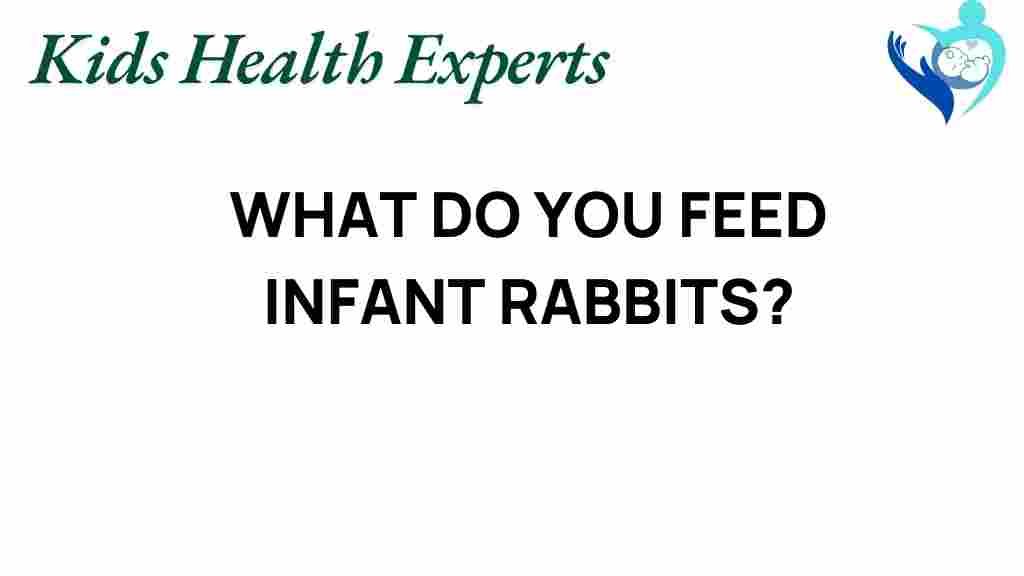The Essential Guide to Feeding Infant Rabbits: What You Need to Know
Bringing a new pet into your home can be a joyous experience, especially when it involves adorable infant rabbits. However, caring for young rabbits requires specific knowledge about their nutrition and feeding habits. This guide will provide you with essential information on rabbit nutrition, feeding guidelines, and tips to ensure your infant rabbits thrive in their new environment.
Understanding Infant Rabbits and Their Nutritional Needs
Infant rabbits, also known as kits, are born blind and hairless, relying entirely on their mother’s milk for sustenance during the first few weeks of life. As they grow, their dietary needs will change significantly. Understanding these changes is crucial for maintaining optimal rabbit health.
The Importance of Rabbit Nutrition
Proper rabbit nutrition is vital for the growth and development of young rabbits. A well-balanced rabbit diet helps in:
- Promoting healthy growth and weight gain
- Preventing digestive issues
- Supporting a strong immune system
- Ensuring overall well-being
Feeding Guide for Infant Rabbits
Feeding infant rabbits can be broken down into several stages:
1. Newborn Stage (0-3 Weeks)
During this stage, kits should rely solely on their mother’s milk. If the mother is not available, you can use a special milk replacer designed for rabbits. Regular cow’s milk or goat’s milk is not suitable for infant rabbits. Here’s how to feed them:
- Use a syringe or a small bottle designed for feeding small animals.
- Warm the milk replacer to body temperature before feeding.
- Feed them every 2-3 hours, ensuring they are sucking properly.
2. Transition Stage (3-6 Weeks)
As the kits reach three weeks, they will begin to nibble on solid food. This is a critical time for introducing hay and pellets:
- Introduce high-quality alfalfa hay, which is rich in protein and calcium.
- Offer specially formulated pellets for young rabbits; avoid adult rabbit pellets.
- Continue to provide milk replacer until they are fully weaned by six weeks.
3. Weaning Stage (6-8 Weeks)
By the time they are six weeks old, infant rabbits should be weaned off milk. At this stage, they should primarily eat hay and high-fiber pellets:
- Ensure unlimited access to fresh hay at all times.
- Introduce fresh vegetables gradually, starting with leafy greens.
- Monitor their eating habits to ensure they are adapting well to solid foods.
4. Post-Weaning (8 Weeks and Older)
After weaning, your young rabbits will require a balanced diet:
- High-quality hay (timothy hay or orchard grass) should make up the bulk of their diet.
- Pellets should be high in fiber and low in protein (around 16% protein).
- Introduce a variety of fresh vegetables, ensuring they are rabbit-safe.
Rabbit Diet Essentials
When feeding your infant rabbits, keep in mind the following dietary essentials:
- Hay: The cornerstone of any rabbit’s diet, hay provides necessary fiber for digestion.
- Pellets: Choose high-quality pellets that are specifically formulated for young rabbits.
- Fresh Vegetables: Introduce leafy greens like romaine lettuce, kale, and cilantro.
- Fresh Water: Always provide clean and fresh water to keep them hydrated.
Common Mistakes to Avoid
When caring for infant rabbits, it’s easy to make mistakes. Here are common pitfalls to avoid:
- Feeding them cow’s milk instead of a proper milk replacer.
- Introducing solid foods too early, which can cause digestive issues.
- Overfeeding pellets, which can lead to obesity and health problems.
- Neglecting the importance of hay in their diet.
Troubleshooting Feeding Issues
If you encounter feeding issues with your infant rabbits, consider the following troubleshooting tips:
- Refusal to Eat: If your kits refuse to eat, check their environment for stressors and ensure they are comfortable.
- Diarrhea: This can be a sign of dietary issues; review what you are feeding them and adjust accordingly.
- Weight Loss: Monitor their weight regularly. If they are losing weight, consult a veterinarian.
Rabbit Health and Nutrition
Regular monitoring of your infant rabbits’ health is crucial. Here are a few health indicators to watch for:
- Healthy weight gain is essential for growth.
- Look for signs of a healthy coat, which should be shiny and smooth.
- Check their droppings; they should be firm and round.
- Monitor their energy levels; lethargy can indicate health issues.
Conclusion
Caring for infant rabbits requires a solid understanding of their nutritional needs and proper feeding practices. By following this comprehensive feeding guide, you’ll ensure that your young rabbits receive the essential nutrients they need to grow healthy and happy. Remember, rabbit nutrition plays a pivotal role in their health, and as a responsible pet owner, it’s your duty to provide them with the best care possible.
For further information on rabbit care and nutrition, you can visit this resource that offers valuable insights into keeping your pets healthy.
Additionally, check out this guide for more tips on animal care and how to maintain a balanced rabbit diet for your beloved pets.
This article is in the category Care and created by KidsHealthExperts Team
